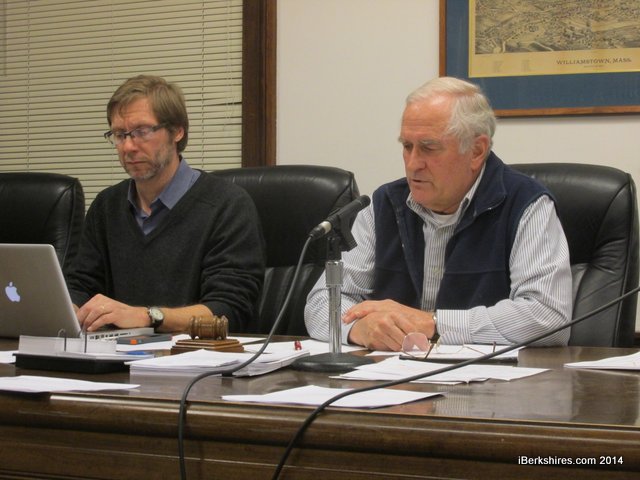Williamstown CPC Votes to Fund Four Applications
 Community Preservation Committee Chairman Philip McKnight, right, and Secretary Mark Reinhardt at Tuesday's meeting. Community Preservation Committee Chairman Philip McKnight, right, and Secretary Mark Reinhardt at Tuesday's meeting. |
WILLIAMSTOWN, Mass. — The Community Preservation Committee on Tuesday voted to recommend that town meeting fund four proposals totaling about $260,500.
The big-ticket item is a $100,000 commitment to the Highland Woods senior housing project, which the committee OK'd on a 6-0 vote after lengthy discussion.
Several members of the committee pressed Berkshire Housing Development Corp. President Elton Ogden as to why the six-figure allotment of Community Preservation Act funds is so necessary to a project currently budgeted in excess of $12 million.
Ogden and affordable housing advocates encouraged the committee not to discount the importance of the contribution, which developers project could translate into a $30 per month reduction in rent for the apartments' eventual occupants.
"At 60 percent of [Area Median Income], they're making $24,000 a year, maybe, so that kind of money will help them pay for groceries, heat, anything like that," Affordable Housing Committee member Dylan Stafford said. "These are people for whom any unexpected expenses could put them off for a while."
Pamela Burger of the town's Council on Aging agreed.
"A number of the people coming from the Spruces [Mobile Home Park] who we hope will be applicants to Highland Woods have been paying a really low rent," Burger said. "For some of them, their income is $800 a month. I'm re-enforcing that that $30 monthly figure is important."
CPC member and Town Manager Peter Fohlin initially told his colleagues he would be more inclined to vote in favor of the $100,000 if he had an iron-clad guarantee it would go toward that $30-per-month reduction rents. But he indicated he was unconvinced of the the money's necessity to do that.
But Ogden persuaded Fohlin with an argument that came at the end of the discussion of the proposal.
Ogden explained to the committee that the $100,000 is needed to make the Highland Woods project more attractive to funders at the Massachusetts Department of Housing and Community Development. When it looks at funding packages for projects, DHCD does not like to see "deferred payment loans" in excess of $2 million, but Highland Woods was pushing the envelope — closer to $3 million. The $100,000 in CPA money would help keep that number a little bit lower, Ogden told the committee.
"That's the most important thing you've said in three meetings," Fohlin said. "That was helpful."
In addition to Highland Woods, the CPC voted to recommend town meeting approve $17,570 for curatorial work and preservation at the Williamstown Historical Museum, $68,000 for an agricultural land preservation project of Williamstown Rural Lands Foundation and $75,000 in unrestricted funds for the town's Affordable Housing Trust.
Even though it is recommending more than $260,000 in spending for FY15, the CPC still plans to set aside nearly half the $266,000 in anticipated CPA revenues.
The committee voted unanimously not to recommend to town meeting a proposal from the Affordable Housing Trust to start a "buy-down" program to purchase distressed residences, renovate them and make them available for either low rents or below-market value purchases with deed restrictions.
The committee voted unanimously to ask the town to earmark $135,000 from the anticipated revenue to help reduce the bond the town will need to offer to pay its remaining $1.375 million obligation to the Cable Mills housing project.
 Town Manager and CPC member Peter Fohlin helps the committee keep track of the numbers. Town Manager and CPC member Peter Fohlin helps the committee keep track of the numbers. |
The town in 2009 voted to contribute $1.525 million in CPA funds for the project on the rationale that it will preserve historic structures, provide subsidized housing and create recreation space in the form of pedestrian access to the Green River.
Not all of the money the committee recommends spending in fiscal 2015 will come from the FY15 anticipated revenue stream.
All of the $68,000 for the WRLF project is coming from $187,500 in unappropriated reserve funds set aside solely for the purpose of open space and recreation. By law, at least 10 percent of CPA funds each year must be set aside for each of the statutory purposes - housing, open space and historic resources. If all of the money is not spent in any given year, it is held in reserve for that purpose only.
The $100,000 for Highland Woods will be offset, in part, by $80,000 previously appropriated to Berkshire Housing and Williamstown Elderly Housing Corp. to foster expansion of Proprietor's Field, the senior housing project just west of the land where BHDC and its non-profit partners plan to build Highland Woods.
Tags: affordable housing, community preservation, senior housing,















